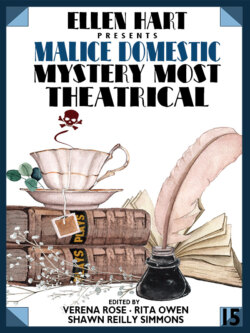Читать книгу Ellen Hart Presents Malice Domestic 15: Mystery Most Theatrical - Karen Cantwell - Страница 7
На сайте Литреса книга снята с продажи.
PREFACE
ОглавлениеELLEN HART PRESENTS
Apple pie and ice cream. A hot summer day and a cold beer. A wintry evening and a cozy fire. I think we can all agree that some things are simply meant to go together. Continuing with that theme, what could be more delicious than a mix of mystery and the theater?
The backstage lore of an ancient craft; theatrically poisonous gossip; a small, glittering world filled with masters of disguise strutting on and off the stage; big egos throwing tantrums, flinging tiaras, and a singular ghost light shining from the darkness of an empty stage—these are some of the elements that compel us to settle into the magic and keep on reading.
It’s always fascinated me that writers go through much the same process in developing a character as an actor does. To inhabit a persona, to understand an individual’s inner life, plan their actions, and make them believable, a writer, like an actor, asks questions. What does this person look like? Sound like? How do they dress? Move? Most important of all are the questions that get at world-view and intent. What does this character want out of life? What does she want in the story, why does she want it, and why does she want it now? Both the writer and the actor have to dive deep to find those answers. Sandford Meisner, the great acting teacher, once said, “Acting is doing things truthfully under imaginary circumstances.” I think that’s a powerful statement, as well as an ambitious undertaking, for both an actor and a writer.
One of the main characters in my Jane Lawless mystery series is a theater director—a woman aptly named Cordelia Thorn. This vivid, outrageous, sometimes egotistical, always larger-than-life persona has fought to wrestle the limelight away from my main character since the first novel appeared on bookstore shelves. In my fourth mystery, I used Cordelia’s personal history as a backdrop.
A Small Sacrifice begins with a flashback. We’re introduced to two acting students, both in their final year of drama school at the University of Minnesota. Each man, filled with youthful, testosterone-fueled bravado, boasts that he has more acting talent than the other. Since they have no real way to prove such a thing on stage, they decide to take their superior abilities out into the real world. They each devise a crime they will commit, trusting their skills to carry them through without being caught. (I pilfered the general idea from an article I’d once read in People magazine.)
One of the young men in question ends up being arrested and sent to jail, while the other stumbles over the woman of his dreams while committing his crime, which is never discovered. The mystery then moves to the present, to a theater in a small town in rural Wisconsin, where these two men, along with their theater department pals, have gathered—not for a reunion, but for something much darker and more difficult. Cordelia Thorn is one of the pals. By the end of the novel, theatrics have taken a backseat to a more poignant, nuanced truth about life, sacrifice, and the depth of the love these friends still feel for each other.
We all have our favorite theater mysteries. Those written by Dame Ngaio Marsh come to my mind, as do several by Simon Brett, Reginald Hill, and Anne Perry. We love the humor and the fun. We’re drawn to the settings and the personalities. And that’s why I ask you to consider the volume of short stories you’re holding in your hand. As you read, I guarantee you’ll find these stories are all part of that same long and hallowed tradition. After all, the theater is where we sit in the dark and watch people in the light teach us about what it is to be human. Theater mysteries are where we go to be both enlightened and entertained.
And thereby, as Shakespeare once said, hangs the tale.
—Ellen Hart
